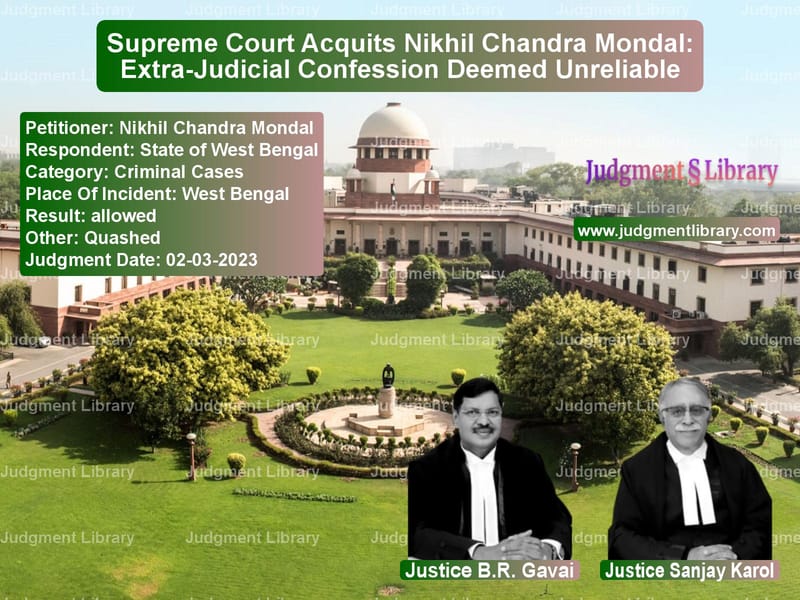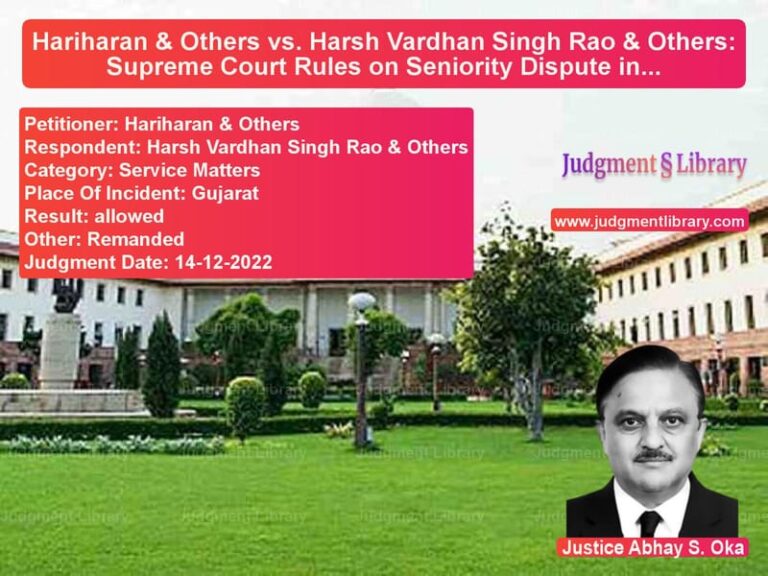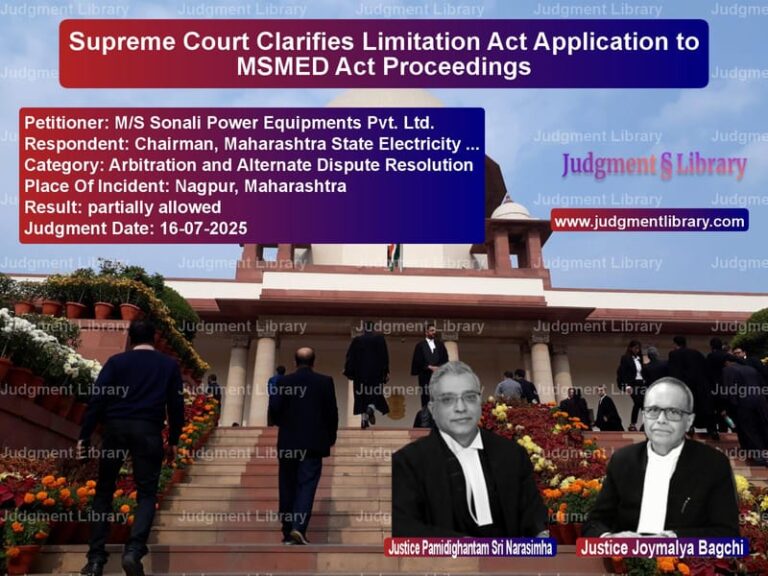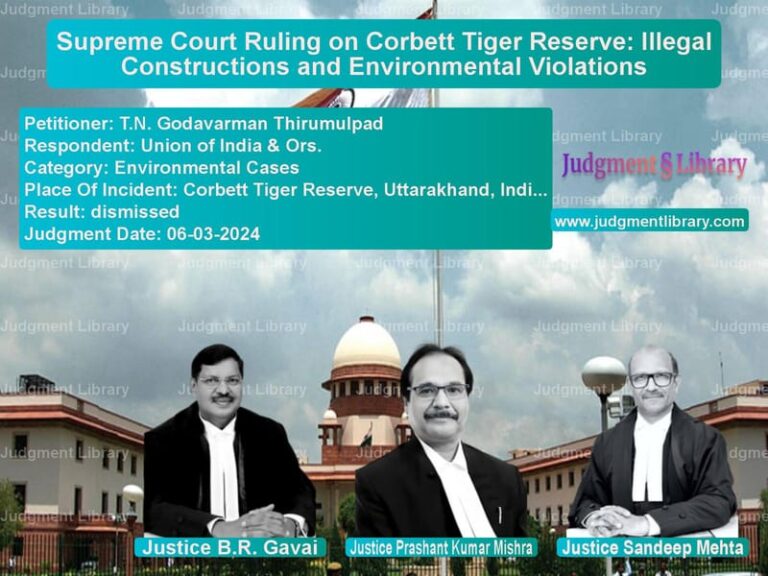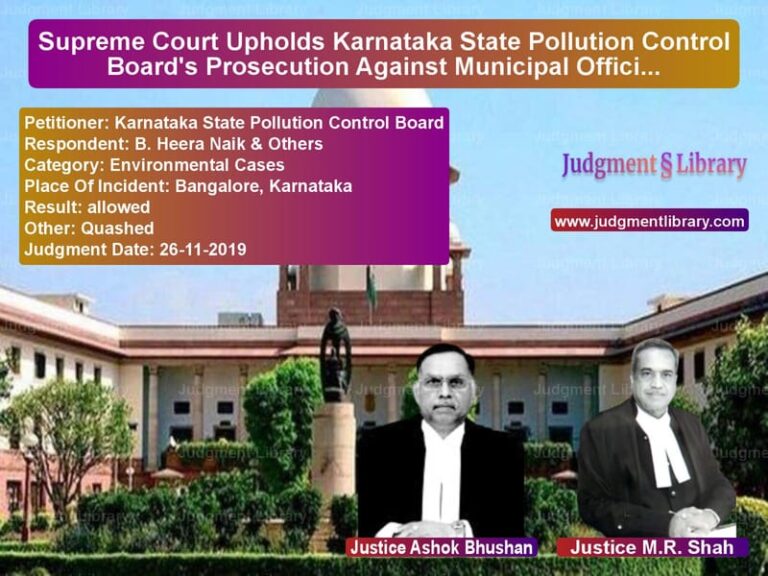Supreme Court Acquits Nikhil Chandra Mondal: Extra-Judicial Confession Deemed Unreliable
The Supreme Court of India, in a significant judgment, has acquitted Nikhil Chandra Mondal in a murder case after setting aside his conviction based on an extra-judicial confession. The case, Nikhil Chandra Mondal v. State of West Bengal, involved allegations of murder under Section 302 IPC. The Court emphasized the principles of circumstantial evidence, the credibility of extra-judicial confessions, and the burden of proof in criminal cases.
Background of the Case
The case pertains to the discovery of a woman’s dead body near a railway track in Ambalgisan, West Bengal, on March 11, 1983. The police registered an Unnatural Death (UD) Case No. 7/83 and began an investigation. The deceased was identified as the wife of the appellant, Nikhil Chandra Mondal. The prosecution alleged that the appellant had murdered his wife using a sharp weapon.
The case primarily relied on an extra-judicial confession allegedly made by the accused before three witnesses. The Trial Court acquitted the accused on March 31, 1987, but the Calcutta High Court reversed the acquittal and convicted him for murder, sentencing him to life imprisonment. The appellant challenged this decision before the Supreme Court.
Petitioner’s Arguments (Nikhil Chandra Mondal)
The appellant, represented by Advocate Rukhsana Choudhury, argued:
- The High Court erred in reversing a well-reasoned acquittal judgment passed by the Trial Court.
- The extra-judicial confession was unreliable, as the statements of the three witnesses were inconsistent.
- The Trial Court had already disbelieved the prosecution’s version after closely examining the evidence.
- There was no independent corroboration of the alleged confession.
- The High Court interfered with the acquittal without proving that the finding was perverse or illegal.
Respondent’s Arguments (State of West Bengal)
The State, represented by Advocate Astha Sharma, countered:
- The High Court had correctly found that the extra-judicial confession was trustworthy and reliable.
- The accused had admitted to the crime before three independent witnesses.
- The prosecution had established the recovery of blood-stained clothes and the murder weapon from the accused, further strengthening the case.
- The Trial Court failed to appreciate the weight of the prosecution’s evidence.
Supreme Court’s Judgment
The Supreme Court bench, comprising Justices B.R. Gavai and Sanjay Karol, set aside the High Court’s conviction and restored the Trial Court’s acquittal.
“It is a settled principle that extra-judicial confession is a weak piece of evidence. Where an extra-judicial confession is surrounded by suspicious circumstances, its credibility becomes doubtful and it loses its importance.”
Key Observations:
- The Trial Court correctly noted that the evidence of the three witnesses regarding the confession was inconsistent.
- Extra-judicial confessions require a greater degree of scrutiny, especially when they are the primary basis of conviction.
- There was no memorandum statement under Section 27 of the Evidence Act regarding the alleged recovery of the murder weapon.
- The High Court failed to establish how the Trial Court’s acquittal was perverse or unreasonable.
Legal Precedents Considered
The Court relied on the following precedents:
- Sharad Birdhichand Sarda v. State of Maharashtra (1984) 4 SCC 116 – Laid down the principles for conviction based on circumstantial evidence.
- Sahadevan v. State of Tamil Nadu (2012) 6 SCC 403 – Established that extra-judicial confessions must be voluntary, truthful, and corroborated by other evidence.
- Rajesh Prasad v. State of Bihar (2022) 3 SCC 471 – Held that appellate courts should not interfere with an acquittal unless the findings are perverse.
Key Takeaways from the Judgment
For Criminal Law:
- An extra-judicial confession alone is insufficient for conviction unless corroborated by strong independent evidence.
- Courts must be cautious when interfering with an acquittal unless the findings are manifestly illegal or perverse.
For Judicial Procedures:
- Trial Courts’ findings must be respected unless they suffer from a fundamental error.
- Appeal courts must avoid substituting their own views unless necessary.
For Law Enforcement:
- Investigators should rely on concrete forensic and material evidence rather than mere confessions.
- Proper procedural compliance, such as recording memorandum statements, is crucial in criminal cases.
Conclusion
The Supreme Court’s decision in Nikhil Chandra Mondal v. State of West Bengal reinforces the principle that extra-judicial confessions alone cannot form the basis for conviction unless corroborated by reliable evidence. The ruling ensures that wrongful convictions based on weak evidence are prevented and upholds the fundamental principle of ‘innocent until proven guilty.’
Petitioner Name: Nikhil Chandra Mondal.Respondent Name: State of West Bengal.Judgment By: Justice B.R. Gavai, Justice Sanjay Karol.Place Of Incident: West Bengal.Judgment Date: 02-03-2023.
Don’t miss out on the full details! Download the complete judgment in PDF format below and gain valuable insights instantly!
Download Judgment: nikhil-chandra-monda-vs-state-of-west-bengal-supreme-court-of-india-judgment-dated-02-03-2023.pdf
Directly Download Judgment: Directly download this Judgment
See all petitions in Murder Cases
See all petitions in Bail and Anticipatory Bail
See all petitions in Judgment by B R Gavai
See all petitions in Judgment by Sanjay Karol
See all petitions in allowed
See all petitions in Quashed
See all petitions in supreme court of India judgments March 2023
See all petitions in 2023 judgments
See all posts in Criminal Cases Category
See all allowed petitions in Criminal Cases Category
See all Dismissed petitions in Criminal Cases Category
See all partially allowed petitions in Criminal Cases Category

